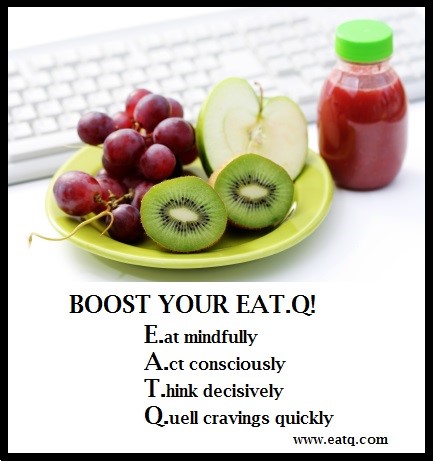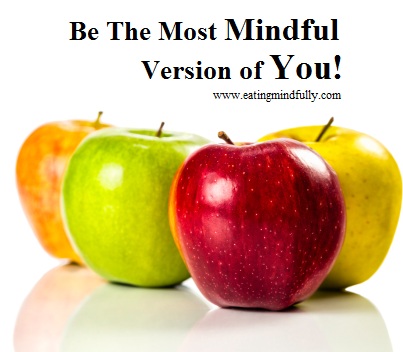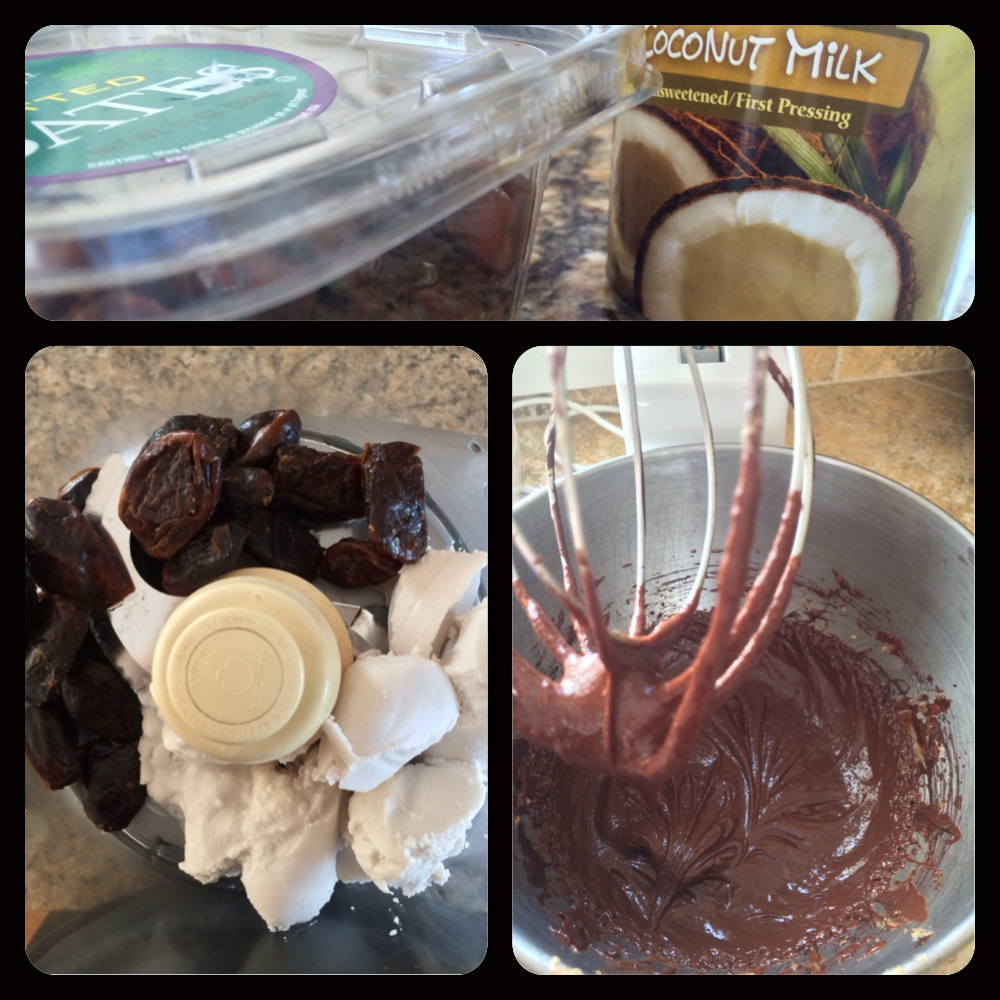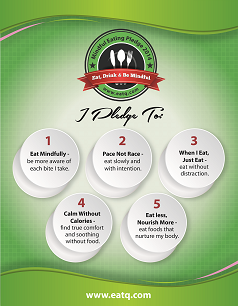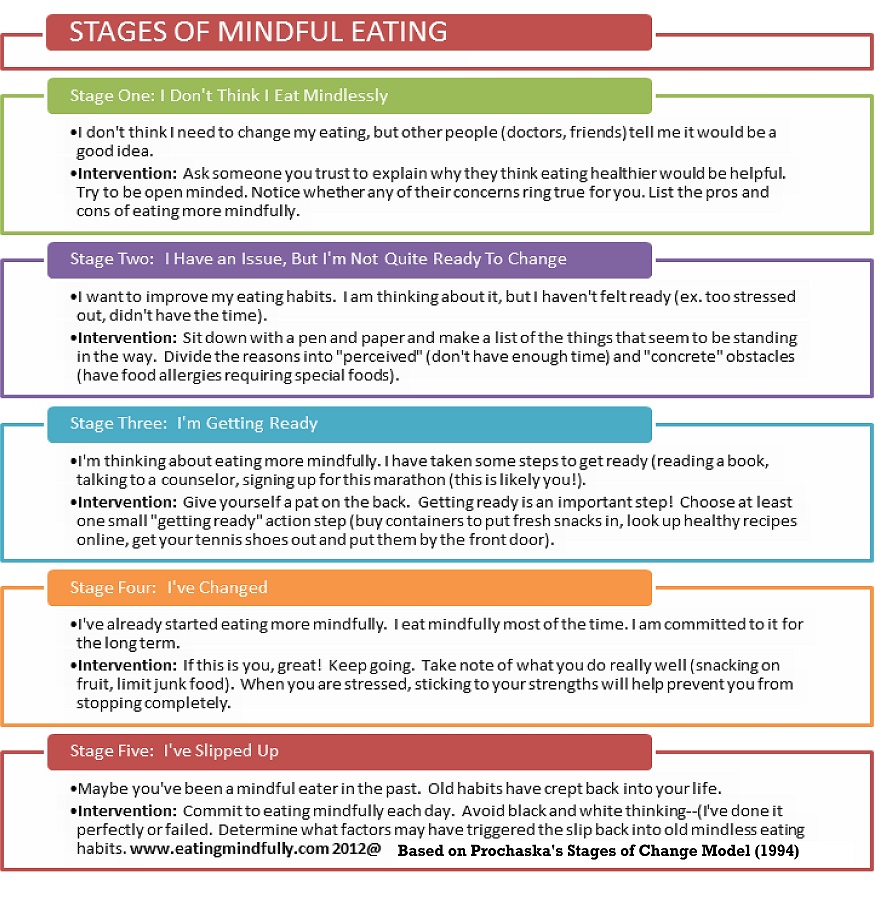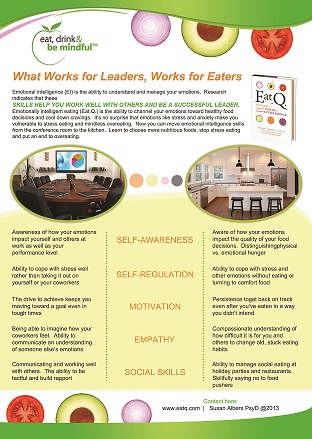Quick & Easy Energy Boosters to Avoid Boredom Eating
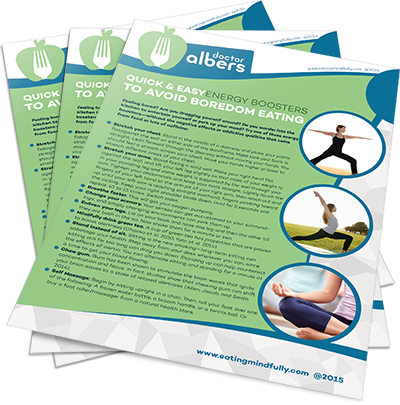
Feeling bored? Are you dragging yourself around? Do you wander into the kitchen to entertain yourself or perk up your mood? Try one of these energy boosters—without the negative effects or addictive qualities that come from food or lots of caffeine:
- Stretch your chest. Stand in the middle of a doorway and place your palms flat against the wall on either side of the doorframe. Make sure your back is straight. Lean forward through the doorway without moving your hands. You should feel a stretch across your chest. Move your hands higher or lower to stretch different areas of your chest.
- Stretch your arms. Stand facing a solid wall. Place your right hand flat against the wall, and lift your left leg slightly so that most of your weight is in your standing leg and some weight is supported by the wall through your arm. Tighten your abdominals and keep your back straight. Lightly touch the fingers of your left hand to the arm pit of your right arm, then reach out and up until your left arm is reaching straight overhead, fingers pointing toward the ceiling. Keep your right shoulder blade down. Hold for 5 seconds and repeat 10 to 15 times. Switch sides.
- Breathe faster. This will get your oxygen pumping.
- Change your scenery. Your senses can get accustomed to your surroundings, and simply changing environments can perk them up.
- Enliven your legs. Lie on your back and raise one leg and then the other till they are both in the air. Now shake them for a minute or two.
- Mindfully drink green tea. A cup of green tea has properties that are proven to boost alertness (Chacko et al. 2010; Yoto et al. 2014).
- Stand instead of sit. Sitting is the new smoking—long-term sitting can sabotage your health. Step away from your desk whenever you can, since sitting still for too long can drag you down. Standing up can help counteract the effects of inertia. You can alternate sitting and standing for a minute at a time to get your blood flowing.
- Chew gum. Gum has been shown to stimulate the brain waves that ignite concentration and focus. In fact, studies show that chewing gum can shift your brain waves to a state of relaxed alertness (Allen, Jacob, and Smith 2014).
- Self Massage. Begin by sitting upright in a chair. Then, roll your foot over one of the following: A frozen water bottle, a broom handle, or a tennis ball. Or buy a foot roller/massager from a natural health store.
There are many other tips that are just as simple and effective in my new book, 50 More Ways to Soothe Yourself Without Food. Click here to pre-order it.
Thank you, Mindful Eating in 2014!
A Mindful Thank You and a Recap of 2014!
Bye, bye 2014. I want to take a moment to express sincere gratitude for this amazing year. Yes, there was a LOT of hard work, some bumps along the way AND many awesome, mindful moments that I have to pause and acknowledge.
1) The Mindful Eating Summit. It was so exciting interviewing some of the most amazing mindful eating experts. The overwhelming feedback was fantastic! You gave many great suggestions for next year! P.S. Don’t forget to sign up right now for the Mindful Eating Summit 2.0 in August coming up next year! It will be even better. www.mindfuleatingsummit.com 
2) The Chocolate Challenge. Thank you to the awesome fans and fun bloggers who participated in February. What a yummy way to practice mindful eating.
3) 1/2 Marathon on the Great Wall of China. Doing this marathon was a good metaphor for my 2014 year. Sometimes it is better not to know what you are getting yourself into and just say, “Yes! I’m game.” The marathon and the year were steep and mostly uphill but the view was amazing and simply breathtaking. At the end, I am 100% glad I did it. 
4) EatQ reaching NYT bestseller status. Yes, it only took 14 years of diligent writing but whose counting! I am so profoundly grateful for the opportunity to share the message of mindful eating with so many people around the globe. 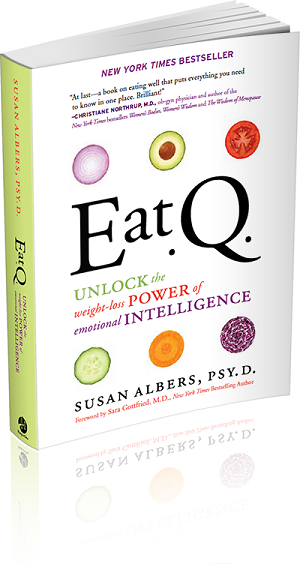
5) Getting to snuggle back into my writing den (I love writing!) and starting my new book which will be out in October 2015. Sign up on facebook in April for my Emotional Eating Summit!
6) I admire and appreciate the people I work with directly/and readers who send emails/facebook fans. Hardest working and bravest people ever.
Are you READY for a brand new mindful eating year! Follow me on a new adventure. I can’t wait to share what opportunities I have in store for you!
Task number one if you haven’t done so already, PRINT out the 2015 Mindful Eating Pledge and hang it up.
CLICK HERE for FREE DOWNLOAD! https://mindfuleatingsummit.com/mindful-eating-pledge-2015-2/
Stay tuned for more! 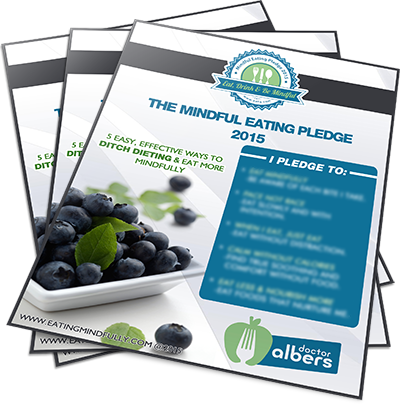
professionalkit
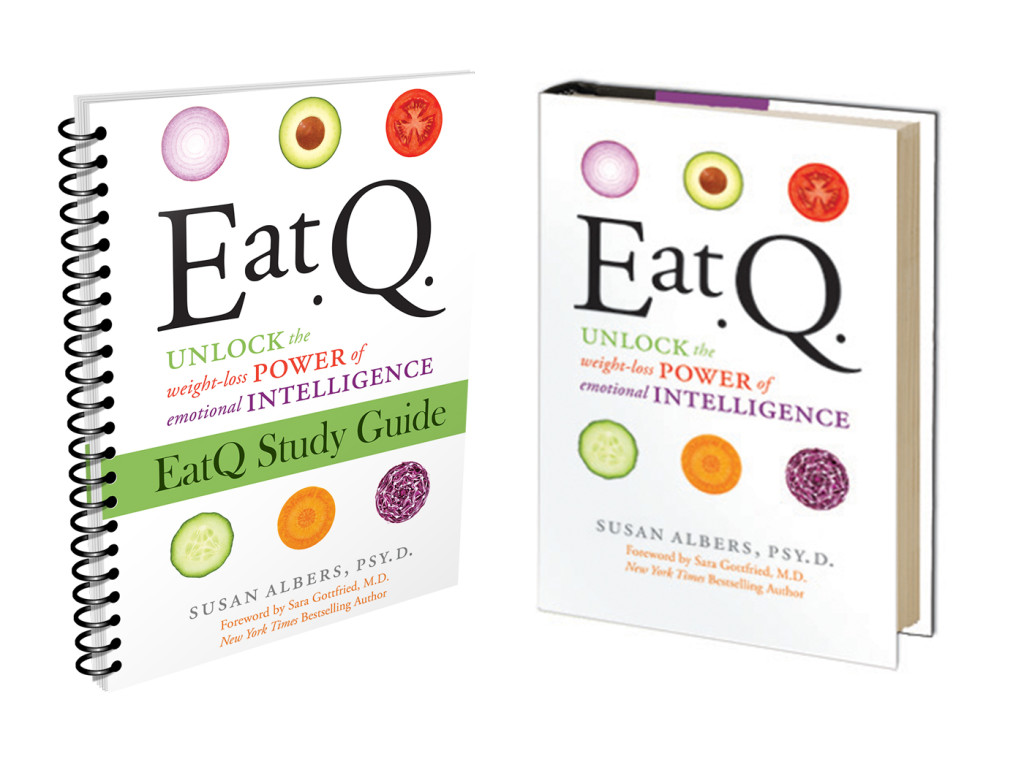
Hello!
Thank you for your interest in the Professional EatQ Tool Kit! With this Kit you will receive the
1) A ppt download and recording with a brief explanation of how to use EatQ with your clients
2) The Emotional Eater’s Toolkit Download
3) EatQ Study Guide–outlining 8 sessions done for you!
4) BONUS access to the Mindful Eating Summit interviews until Oct 7th (see www.mindfuleatingsummit.com) to see the lineup of amazing speakers!
How to get it? Just email your receipt from Amazon or Barnes & Noble to DrAlbers@eatq.com to have the Professional Kit sent directly to you!
swipefile

General Invitation: Facebook posting
1.
My friend and colleague, Dr. Susan Albers, author of Eating Mindfully and Cleveland Clinic psychologist, has put together a fantastic FREE event with 20 of the world’s top leading eating experts to share information that you won’t hear anywhere else. It will teach you how to boost your nutrition, end mindless overeating and stop feeling guilty when you eat TODAY!
Where can people learn more about mindful eating?
Here are just a few of the presenters in my conference, all of whom offer their own rich, in-depth perspective on health, wellness and mindfulness:
-Dr. Brian Wansink Director of Cornell Food & Brand Lab and best-selling author of Mindless Eating: Why We Eat More Than We Think
-Evelyn Tribole Award-winning registered dietitian an author of Intuitive Eating (co-author)
-Dr. Jim Painter Producer of Portion Size Me, a documentary about fast food and health and featured on CBS’s Early Show
-Margaret Floyd, author of Eat Naked.
-Dr. Katz, author of Disease Proof and contributor to O, the Oprah Magazine
-Dr. Daniel Siegel, Professor of at the UCLA School of Medicine and the founding co-director of the Mindful Awareness Research Center.
-Dr. Alan Christianson specializes in natural endocrinology with a focus on thyroid disorders.
-Jonathan Bailor, author of The Calorie Myth
-Trudy Scott, author of The Anti-Anxiety Food Solution and the upcoming Anxiety Summit in November
-Connie Bennett, sugar expert!
AND MORE!
You can sign up here:
When you do, you will also receive a FREE Ebook: The Emotional Eater’s Tool Kit so you can start taking charge of your eating right NOW!
I will see you there on August 25th-29th!
2.
Do you FINALLY want sound, realistic, practical answers on how you can ditch dieting for good and start eating more mindfully today? If so, sign up for the Mindful Eating Summit taking place August 25th-29th!
It’s a free event hosted by Susan Albers, the author of Eating Mindfully and Cleveland Clinic psychologist. I’m one of 20 speakers that will blow you away with the amazing information we have to share on how to transform your eating!
Here’s that link again:
See you there!
3.
Ditch dieting for good! 20 of the world’s top eating experts share their best-kept secrets on weight loss, mindful eating, diabetes, nutrition, emotional eating, cravings, and more August 25th-29th! Check it out for FREE here:
Get your free ebook, the Emotional Eating Tool Kit, when you sign up for an amazing new free, online summit taking place August 25th-29th! The Mindful Eating Summit brings together a panel of eating experts to give you all of the insider information that nobody else is telling you on how to boost your nutrition, stop overeating and transform your relationship to food! Register today to learn the truth about eating well and step-by-step tips. Grab your seat now!
4.
Join me and 20 other eating experts as we reveal our insider secrets to healing your relationship with food. Come watch my interview today TODAY during the Mindful Eating Summit! I’m sharing my top secrets on X, Y, and Z! See you there:
5.
Confused by all the conflicting information about how to eat out there? Bust through the diet myths with the FREE Mindful Eating Summit taking place August 25th-29th! Enroll today to STOP struggling with food and START enjoying eating again TODAY:
NEWSLETTER
1.
Did you know that 95% of dieters gain back the weight they lost within 5 years (plus some!). It’s no surprise that DIETING DOESN’T WORK.
The good news is that my friend, Dr. Susan Albers, Cleveland Clinic psychologist and author of Eating Mindfully, put together a panel of experts who will show you WHAT DOES WORK!
Why? Because these statistics are staggering and they are no longer ok! Fad diets destroy your health & leaving you feeling hopeless and frustrated.
If you want to finally take charge of your eating, then I have something very exciting to share with you!
Join this amazing FREE event with 20 of the world’s top leading health experts.
It’s called the Mindful Eating Summit and it will change everything you thought you knew about how to eat!
Did I mention it’s FREE?
Go to sign up now!
2.
Have you registered for the FREE Mindful Eating Summit yet? Join us August 25th-29th as we start conversations with 20+ eating experts. This highly unique event will showcase the voices of 20+ top professionals (researchers, clinicians, dietitians, therapists, writers). This will include the world’s thought-leaders in Mindful Eating Psychology. The goal is to deliver practical, inspirational, cutting-edge, clinical techniques, and innovative approaches to many of our unique eating challenges– body image, nourishing ourselves, overeating, binge eating, disordered eating, fad dieting, nutrition-linked health conditions, and much more. The mission: to educate and inform the public and professionals about mindful eating in a free and easily accessible format. SIGN UP HERE: www.mindfuleatingsummit.com
3.
Do you want to eat more mindfully, lose/manage weight, and stop emotional eating? Dr. Susan Albers, psychologist at the Cleveland Clinic and author of Eating Mindfully, is hosting the 1st Annual Mindful Eating Summit, a free online event August 25th-29th. You can sign up for free today on www.mindfuleatingsummit.com. All viewers receive a free ebook, The Emotional Eating’s Tool Kit!
4.
Have you registered for the FREE Mindful Eating Summit yet? Join us August 25th-29th as we start conversations with 20+ eating experts. This highly unique event will showcase the voices of 20+ top professionals (researchers, clinicians, dietitians, therapists, writers). This will include the world’s thought-leaders in Mindful Eating Psychology. The goal is to deliver practical, inspirational, cutting-edge, clinical techniques, and innovative approaches to many of our unique eating challenges– body image, nourishing ourselves, overeating, binge eating, disordered eating, fad dieting, nutrition-linked health conditions, and much more. The mission: to educate and inform the public and professionals about mindful eating in a free and easily accessible format. SIGN UP HERE: www.mindfuleatingsummit.com
5.
Free ebook! The Eating Eater’s Tool Kit is yours when you sign up for the 1st Annual, free online Mindful Eating Summit, August 25th-29th. This highly unique event will showcase the voices of 20+ top professionals (researchers, clinicians, dietitians, therapists, writers). This will include the world’s thought-leaders in Mindful Eating Psychology. The mission is to deliver practical, inspirational, cutting-edge, clinical techniques, and innovative approaches to many of our unique eating challenges– body image, nourishing ourselves, overeating, binge eating, disordered eating, fad dieting, nutrition-linked health conditions, and much more. www.mindfuleatingsummit.com
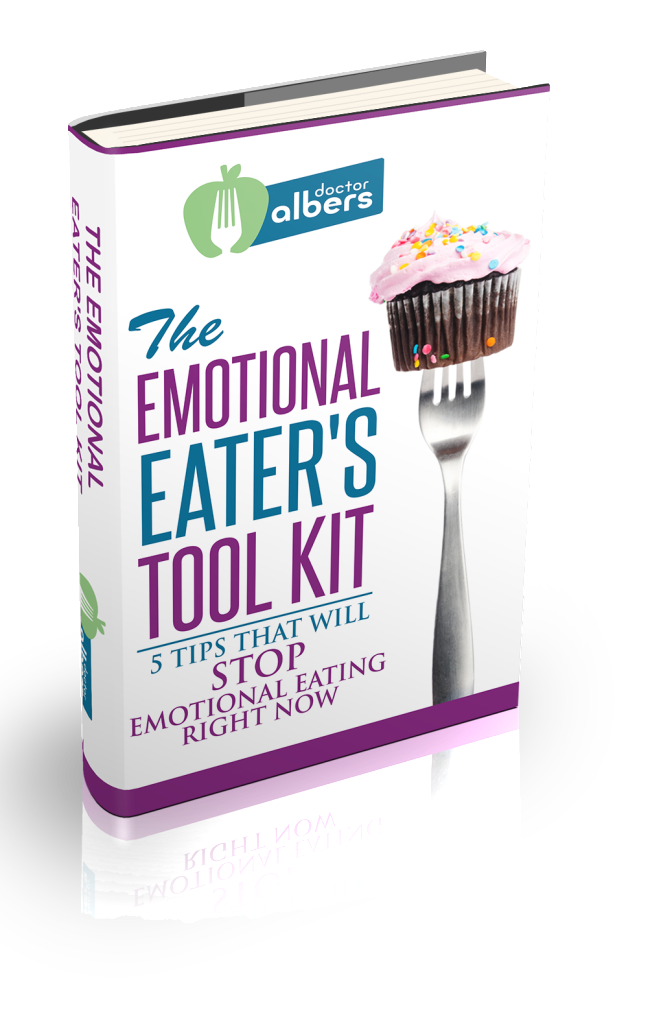 Q&A with Susan Albers for the Mindful Eating Summit
Q&A with Susan Albers for the Mindful Eating Summit

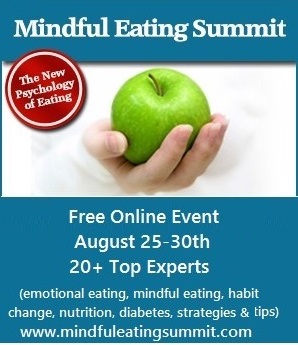

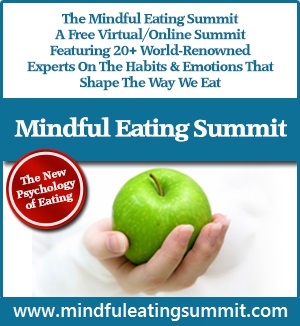
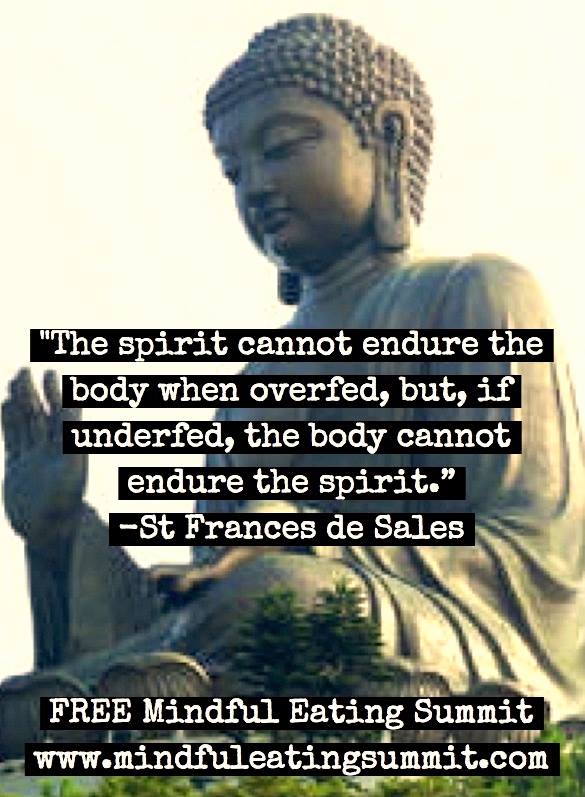

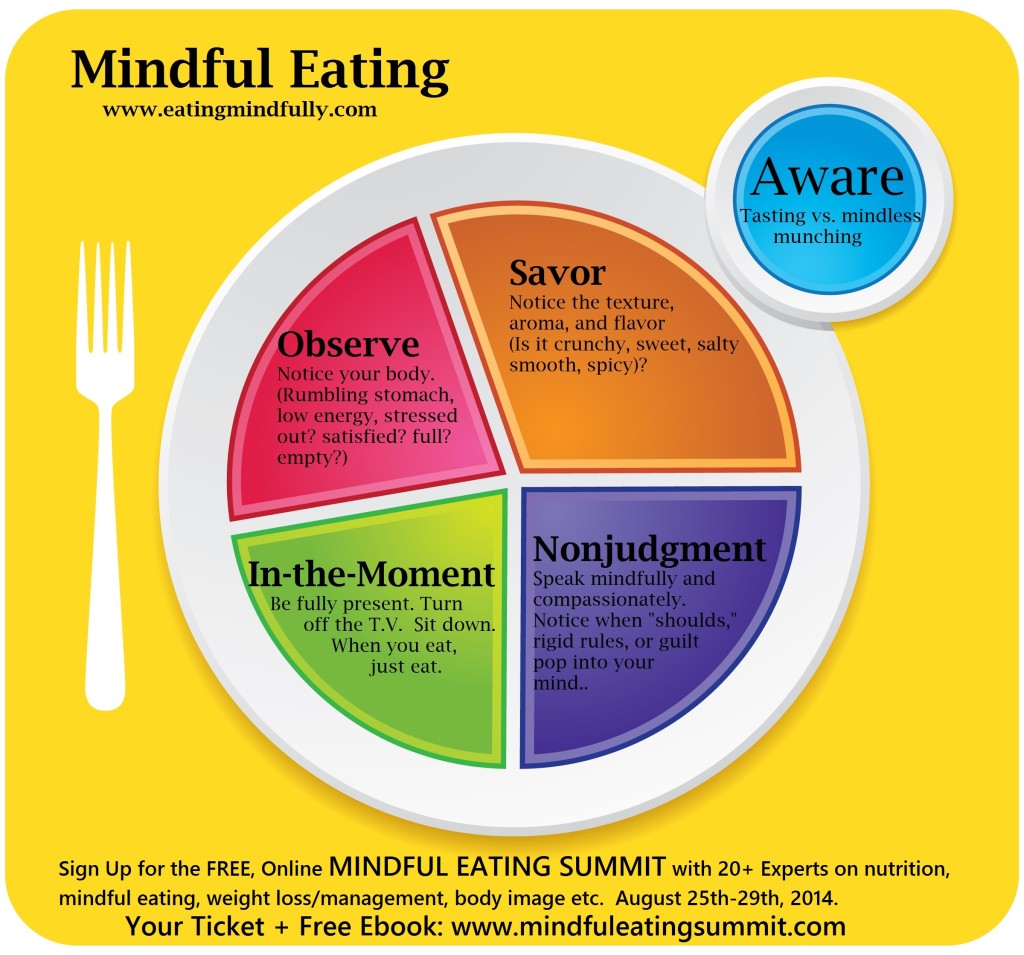
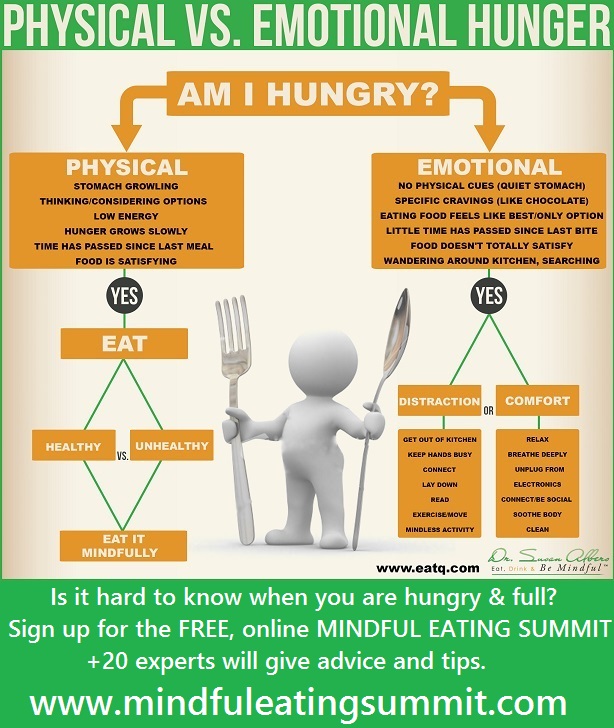
Q&A with Susan Albers for the Mindful Eating Summit
Twitter:
Registered for the FREE Mindful Eating Summit yet? Uncover the #1 secret on how to eat well now:
Discover how you can lose/manage weight and take charge of your eating habits for FREE! Sign up:
Join me and 20 other eating experts as we reveal our insider secrets for eating more mindfully TODAY Sign up:
Come hear my insider secrets to _________________ TODAY during the Mindful Eating Summit
Mindful Eating info you won’t hear anywhere else! Join me for the FREE Mindful Eating Summit
Tips on how to eat more mindfully and lose weight from +20 plus top world experts. Sign up for free on www.mindfuleatingsummit.com
Free Emotional Eating ebook when you sign up for the www.mindfuleatingsummit.com: Tips from +20 experts on how to eat more mindfully today!
August 25th-29th @DrSusanAlbers will host free online, www.mindfuleatingsummit.com featuring +20 eating experts. Sign up today!
Who is the host?
Dr. Susan Albers is a clinical psychologist at the Cleveland Clinic and author of six books on mindful eating including EatQ: How to Unlock the Weight Loss Power of Emotional Intelligence, Eating Mindfully, Mindful Eating 101, Eat, Drink & Be Mindful, 50 Ways to Soothe Yourself Without Food, But I Deserve this Chocolate. She graduated from the University of Denver and completed a post-doctoral fellowship at Stanford University. You may recognize her from Dr. Oz or have read about her in Shape, Fitness, Self Magazine, Prevention etc where she is frequently quoted. “Like” her facebook page for updates on the Summit www.facebook.com/eatdrinkmindful
Info:
This highly unique event will showcase the voices of 20+ top professionals (researchers, clinicians, dietitians, therapists, writers). This will include the world’s thought-leaders in Mindful Eating Psychology. The goal is to deliver practical, inspirational, cutting-edge, clinical techniques, and innovative approaches to many of our unique eating challenges– body image, nourishing ourselves, overeating, binge eating, disordered eating, fad dieting, nutrition-linked health conditions, and much more. The goal: to educate and inform the public and professionals about mindful eating in a free and easily accessible format. SIGN UP HERE: www.mindfuleatingsummit.com
ARTICLE #1
6 Ways to Become a Mindful Eater
By Dr. Susan Albers, psychologist and author of Eating Mindfully & EatQ
Do you want to ditch dieting for good but aren’t sure what to do instead? Mindful eating may be the answer for you. Consider that 95% of dieters gain back the weight they’ve lost within five years. In contrast, clinical studies have shown mindful eating to help people eat 300 less calories a day, reduce their body mass index, feel better about their bodies, prevent weight gain and have a better relationship with food. The good news is that mindful eating is not hard. Read this list to discover some of the most important things a mindful eater does on a daily basis.
1) Mindful eaters don’t eat until they are “full.” Full is an overused and misleading term. Mindful eaters tend to eat until they are no longer hungry or feel satisfied. There is a big difference. By the time you perceive yourself to be “full,” it is often too late, you’ve overeaten. If you’ve dieted for years, your hunger and fullness signals may be crossed. Mindful eating can help rewire your brain to know what genuine physical hunger feels like.
2) Mindful eaters pace themselves. This is not easy. We live in a world that stresses instant access and hurrying; eating is no exception. Mindful eaters tell themselves to “slow down” or try to check in with their pace. Intentionally shifting into a reasonable pace is often easier said than done. How to slow down while you eat is going to be a hot topic at the Mindful Eating Summit where 20+ mindful eating experts will share their knowledge for free this summer. Find out more by clicking here.
3) Mindful eaters are “Choosy.” While mindful eaters may seem like picky eaters, they are often just very discerning about the choices. Mindful eaters really taste food and if they don’t like it, they don’t eat it, just like picky eaters. Also, they aren’t afraid to tailor food to their particular taste. At restaurants, a mindful eater may ask the wait staff to make a few tweaks to their order like holding the bacon or asking for Swiss cheese rather than Cheddar.
4) Mindful eaters are forgiving and flexible. Yes, mindful eaters overeat on occasion! What they don’t do is obsess and beat themselves up as much as dieters. Mindful eaters know that tomorrow is another day and can “let it go.“ Often the strategy is to adjust the amount you eat at the next meal or snack.
5) Mindful eaters tend to gauge their hunger first before taking a bite. Being in the moment and fully present is key to mindful eating. Take a brief moment to ask yourself before taking a bite, “Am I really, really hungry? What I am feeling right now is…” This can help prevent you from walking into emotional eating.
6) Mindful eaters break out of old habits. When you know what habits keep you stuck like multitasking when you eat or nibbling while anxious, you can devote more energy and attention to these particular areas. Sometimes it is changing how you eat more than what you eat.
Is it worth it to adopt these habits? Yes! Hundreds of thousands of people have done it and so can you. To learn more about how a mindful eater thinks and feels, take the Emotional Eating IQ Test
Dr. Susan Albers is a psychologist at the Cleveland Clinic and the author of six books on mindful eating including Eat.Q: Unlock the Weight Loss Power of Emotional Intelligence. She has been quoted in the New York Times, Self, O Magazine, Shape, Fitness, and on the Dr. Oz show. www.eatq.com
ARTICLE #2
HOW TO DITCH DIETING & TAKE THE MINDFUL EATING PLEDGE
If you are one of the millions of people contemplating starting a new diet, you are invited to try something radically different this fall. Instead, take the Mindful Eating Pledge which outlines five straightforward behavior changes that can help you easily shift out of overeating and onto a healthier new foot.
Put simply, mindful eating is about eating with more awareness. This method of eating aims to stop mindless eating behaviors like unconsciously popping food into your mouth while watching T.V. or eating out of a carton of ice cream to ease stress. Studies show that reducing these behaviors can have a significant impact on improving your health and weight.
The Mindful Eating pledge is good news for people who feel frustrated or hopeless with fad diets. Outcome goals (I want to lose five pounds) lead to frustration and are quickly abandoned because they are long term and you can’t control whether they happen. Process goals (eat without distraction) is something you can take charge of and have immediate benefits in the moment such as enjoying food more and reducing the risk of overeating.
Here is a list of the five things you agree to do:
I Pledge To:
• Eat Mindfully—be more aware of each bite I take
• Pace Not Race—eat slowly and with intention Pace Not Race—eat slowly and with intention
• When I Eat, Just Eat—eat without distraction
• Calm Without Calories—find true comfort and soothing without food
• Eat Less, Nourish More—eat foods that nurture my body
Changing the way you eat isn’t easy. But doing it with intention and a smart strategy can make it simpler and within reach. So put away the diet books and calorie counting. Sign up to take the Pledge, and you will get free Mindful Eating Tools sent right to your inbox throughout the year on www.eatq.com. You can download the pledge and hang it up! Feel free to pass it on.
ALSO, sign up for the MINDFUL EATING SUMMIT. Dr. Susan Albers, psychologist at the Cleveland Clinic and author of Eating Mindfully, is hosting the 1st Annual Mindful Eating Summit. This highly unique event will showcase the voices of 20+ top professionals (researchers, clinicians, dietitians, therapists, writers). This will include the world’s thought-leaders in Mindful Eating Psychology. The goal is to deliver practical, inspirational, cutting-edge, clinical techniques, and innovative approaches to many of our unique eating challenges–body image, nourishing ourselves, overeating, binge eating, disordered eating, fad dieting, nutrition-linked health conditions, and much more. SIGN UP HERE: www.mindfuleatingsummit.com
ARTICLE #3 “Mindful Eating Changed My Life!” (& I Lost 27lbs!)
Every single day I receive amazing emails from people all over the world who are eager to share their story. They explain the many ways mindful eating has changed their life. Let me introduce you to Heather! She is one of the many people who sing the praises of mindful eating. Here is what Heather had to say about the benefits:
1. Dr. Albers: How as mindful eating been helpful to you/changed your life?
Heather: Being mindful to me is a life-long process/practice. Being in-the-moment and having a fun relationship with food. Food is not the enemy, the enemy is between our ears! I went to my nutritionist today and I am down 27 pounds. I know I shouldn’t be focused on the numbers but I want to give a shout out to being a practicing mindful eater.
2. Dr. Albers: Were there difficult aspects that you had to overcoming when learning to eat more mindfully?
Heather: Working around gym folks for part of my day you can say that the diet word comes up almost everyday. Many people have an, “Eat this, don’t eat that approach.” Being mindful allows one to choose what goes in your mouth whether you desire an apple or a bag of chips. That boggled my mind that if I want chocolate lava cake I can have it within the mindful eating guidelines. Which include am I hungry? Is this what I really want? Am I eating this because of emotional reasons etc.
3) Dr. Albers: Who has been helpful/supportive in this new way of eating (ex. friends family etc.)?
Heather: I went to a nutritionist/dietitian who specializes in eating disorders. Her name is Courtney Sansonetti. During my first visit with her, I was waiting for her to place the new and improved diet plan in front of me. Her first words out of her mouth was “I am not putting you on a diet because they don’t work.” She then introduced me to this mindful eating mentality. I was looking at her credentials on her wall because she just said, “No diets!!!!” What!!!!! My second thought was, “She crazy, one of those holistic nuts.” Right after thinking that she said and I quote, “I know it sounds out there, but it’s very practical.” “Great,” I said to myself, she reads minds too. I’m sure my facial expression didn’t help. After listening to her she asked me to go to the book store and to look up Mindful eating and so this is how I stumbled onto Susan Albers books. Haven’t been able to put down her books since then.
4. Dr. Albers: What are your favorite mindful eating tips?
Heather: There are so many helpful tips to choose from. I would have to say really being in-the-moment when eating. Giving eating my undivided attention, no distractions! Also, breathing and knowing that when I exhale my food will still be there!
5. Dr. Albers: How long have you been trying to eat more mindfully?
Heather: I think I’ve been doing mindful eating for three month now. It is a journey because as my nutritionist told me I will have to readjust from time to time. Nobody changes like a light switch. She also, said that each meal is another opportunity to be mindful and all other ways of thinking are a waste of time.
Way to go Heather! Thank you for sharing your inspiring journey toward mindful eating!
ARTICLE #4
The Surprising Benefits of Mindful Eating
Mindful eating is no longer a secret! If you checked out the New York Times article entitled “Mindful Eating as Food for Thought,” it’s likely that it left you “hungry” for more information on how to adopt this healthy, healing way of eating. Mindful eating uses the ancient art of mindfulness, or being present, to help cope with modern eating problems. It’s not a diet. There are no menus or food restrictions. It is developing a new mindset around food.
The good news is that mindful eating can help binge eaters as well as many other eating issues. During the past 20 years, studies have found that mindful eating can help you to 1) reduce overeating and binge eating[1], 2) lose weight and reduce your body mass index (BMI)[2], 3) cope with chronic eating problems such as anorexia and bulimia, and reduce anxious thoughts about food and your body[3] and 4) improve the symptoms of Type 2 diabetes.[4] Thus, it has many benefits!
Intuitively, it makes sense that mindful eating is helpful to overeaters. It slows you down, makes you more aware of portion sizes and helps you get out of negative, automatic food habits like overeating while watching your favorite TV show. So how does it also help people who have other problematic eating habits?
In a nutshell, whether you are overeating or being overly restrictive when you diet, it’s likely that you have lost track of your hunger and fullness. This break between your body and mind needs to be healed. Mindful eating can generally help in three ways:
1) Mindful eating plugs you back into your body’s cues so you know when to stop and start eating. This can be such a difficult task if your sense of hunger and fullness has been skewed or warped by large restaurant portions, fad diets or comfort eating.
2) Being mindful can bring about better management of your emotions. Sometimes people restrict or overeat as a way to cope with negative feelings. Eating and not eating can distract you from your worries. When you have healthier ways of coping, such as mindful breathing and letting go of anxiety, you may no longer manage your emotions through your food choices. You can tolerate your emotions, as uncomfortable as they may be, without pushing them away or stuffing them down with food.
3) Mindfulness changes the way you think. Rather than reacting to food-related thoughts that urge you to overeat, overly restrict your diet or emotionally eat, etc., you respond to them. You can hear these thoughts without obeying them.
So if you aren’t binge eating, don’t worry. Mindful eating can be helpful to almost everyone.
2 Ways to Get Started
1) Just Be Mindful. Being more attentive and aware in all aspects of your life can help you to improve your eating habits. This is good news if you aren’t ready to change what you put on your plate. Start by being more mentally present with your significant other, put away your cell phone and be more engaged with what you are doing and do one thing at a time instead of multitasking. When you are ready to change your meal habits, you will have more practice on how to be attentive and present. It’s easy to eat an entire plate of food and not taste one bite.
2) The Four Mindful Points: Check in with each dimension of mindfulness. When you eat, ask yourself these questions:
1. Mind: Am I tasting each bite or am I zoned out when I eat?
2. Body: How does my body feel before and after I eat? Low energy? Stomach rumbling? Full? Empty?
3. Feeling: What do I feel about this food? Guilty? Pleasure? Joy? Disappointment? Regret?
4.Thoughts: What thoughts does this food bring to mind? Memories? Beliefs? Myths? Fears?
Thank you for the fantastic article on mindful eating! We need to continue to spread the word that diets don’t work. Instead, mindful eating may be one key to turning around all of our unhealthy eating patterns. Eat, drink and be mindful!
[1] Kristeller J. L. and R. Q. Wolever. 2011. “Mindfulness-Based Eating Awareness Training for Treating Binge Eating Disorder: The Conceptual Foundation.” Eating Disorders. 19(1): 49-61.
Baer, R. A., S. Fischer, and D. B. Huss. 2005. “Mindfulness-Based Cognitive Therapy Applied to Binge Eating: A Case Study.” Cognitive and Behavioral Practice 12: 351-358.
[2] Tapper, K., C. Shaw, J. Ilsley, A. J. Hill, F. W. Bond, and L. Moore. 2009. “Exploratory Randomised Controlled Trial of a Mindfulness-Based Weight Loss Intervention for Women.” Appetite. 52(2): 396-404.
Dalen J., B. W. Smith, B. M. Shelley, A. L. Sloan, L. Leahigh, and D. Begay. 2010. “Pilot Study: Mindful Eating and Living (MEAL): Weight, Eating Behavior, and Psychological Outcomes Associated with a Mindfulness-Based Intervention for People with Obesity.” Complementary Therapies in Medicine. 18(6): 260-4.
Framson, C., A. R. Kristal, J. M. Schenk, A. J. Littman, S. Zeliadt, and D. Benitez. 2009. “Development and Validation of the Mindful Eating Questionnaire.” Journal of American Dietetic Association. 1439-1444.
[3] Rawal, A., J. Enayati, M. Williams, and R. Park. 2009. “A Mindful Approach to Eating Disorders.” Healthcare Counseling & Psychotherapy Journal. 9(4): 16-20.
Proulx, K. 2008. “Experiences of Women with Bulimia Nervosa in a Mindfulness-Based Eating Disorder Treatment Group.” Eating Disorders. 16(1): 52-72.
Hepworth, N. S. 2011. “A Mindful Eating Group as an Adjunct to Individual Treatment for Eating Disorders: A Pilot Study.” Eating Disorders. 19(1): 6-16.
[4] Faude-Lang V., M. Hartmann, E. M. Schmidt, P. Humpert , P. Nawroth, and W. Herzog. 2010. “Acceptance- and Mindfulness-Based Group Intervention in Advanced Type 2 Diabetes Patients: Therapeutic Concept and Practical Experiences.” Psychotherapy and Psychosomatics in Medical Psychology. 60(5): 185-9.
“Mindful Eating Changed My Life!” (& I Lost 27lbs!)

Every single day I receive amazing emails from people all over the world who are eager to share their story. They explain the many ways mindful eating has changed their life. Let me introduce you to Heather! She is one of the many people who sing the praises of mindful eating. Here is what Heather had to say about the benefits:
1. Dr. Albers: How as mindful eating been helpful to you/changed your life?
Heather: Being mindful to me is a life-long process/practice. Being in-the-moment and having a fun relationship with food. Food is not the enemy, the enemy is between our ears! I went to my nutritionist today and I am down 27 pounds. I know I shouldn’t be focused on the numbers but I want to give a shout out to being a practicing mindful eater.
2. Dr. Albers: Were there difficult aspects that you had to overcoming when learning to eat more mindfully?
Heather: Working around gym folks for part of my day you can say that the diet word comes up almost everyday. Many people have an, “Eat this, don’t eat that approach.” Being mindful allows one to choose what goes in your mouth whether you desire an apple or a bag of chips. That boggled my mind that if I want chocolate lava cake I can have it within the mindful eating guidelines. Which include am I hungry? Is this what I really want? Am I eating this because of emotional reasons etc.
3) Dr. Albers: Who has been helpful/supportive in this new way of eating (ex. friends family etc.)?
Heather: I went to a nutritionist/dietitian who specializes in eating disorders. Her name is Courtney Sansonetti. During my first visit with her, I was waiting for her to place the new and improved diet plan in front of me. Her first words out of her mouth was “I am not putting you on a diet because they don’t work.” She then introduced me to this mindful eating mentality. I was looking at her credentials on her wall because she just said, “No diets!!!!” What!!!!! My second thought was, “She crazy, one of those holistic nuts.” Right after thinking that she said and I quote, “I know it sounds out there, but it’s very practical.” “Great,” I said to myself, she reads minds too. I’m sure my facial expression didn’t help. After listening to her she asked me to go to the book store and to look up Mindful eating and so this is how I stumbled onto Susan Albers books. Haven’t been able to put down her books since then.
4. Dr. Albers: What are your favorite mindful eating tips?
Heather: There are so many helpful tips to choose from. I would have to say really being in-the-moment when eating. Giving eating my undivided attention, no distractions! Also, breathing and knowing that when I exhale my food will still be there!
5. Dr. Albers: How long have you been trying to eat more mindfully?
Heather: I think I’ve been doing mindful eating for three month now. It is a journey because as my nutritionist told me I will have to readjust from time to time. Nobody changes like a light switch. She also, said that each meal is another opportunity to be mindful and all other ways of thinking are a waste of time.
Way to go Heather! Thank you for sharing your inspiring journey toward mindful eating!
6 Ways to Become a Mindful Eater
Do you want to ditch dieting for good but aren’t sure what to do instead? Mindful eating may be the answer for you. Consider that 95% of dieters gain back the weight they’ve lost within five years. In contrast, clinical studies have shown mindful eating to help people eat 300 less calories a day, reduce their body mass index, feel better about their bodies, prevent weight gain and have a better relationship with food. The good news is that mindful eating is not hard. Read this list to discover some of the most important things a mindful eater does on a daily basis.
1) Mindful eaters don’t eat until they are “full.” Full is an overused and misleading term. Mindful eaters tend to eat until they are no longer hungry or feel satisfied. There is a big difference. By the time you perceive yourself to be “full,” it is often too late, you’ve overeaten. If you’ve dieted for years, your hunger and fullness signals may be crossed. Mindful eating can help rewire your brain to know what genuine physical hunger feels like.
2) Mindful eaters pace themselves. This is not easy. We live in a world that stresses instant access and hurrying; eating is no exception. Mindful eaters tell themselves to “slow down” or try to check in with their pace. Intentionally shifting into a reasonable pace is often easier said than done. How to slow down while you eat is going to be a hot topic at the Mindful Eating Summit where 20+ mindful eating experts will share their knowledge for free this summer. Find out more by clicking here.
3) Mindful eaters are “Choosy.” While mindful eaters may seem like picky eaters, they are often just very discerning about the choices. Mindful eaters really taste food and if they don’t like it, they don’t eat it, just like picky eaters. Also, they aren’t afraid to tailor food to their particular taste. At restaurants, a mindful eater may ask the wait staff to make a few tweaks to their order like holding the bacon or asking for Swiss cheese rather than Cheddar.
4) Mindful eaters are forgiving and flexible. Yes, mindful eaters overeat on occasion! What they don’t do is obsess and beat themselves up as much as dieters. Mindful eaters know that tomorrow is another day and can “let it go.“ Often the strategy is to adjust the amount you eat at the next meal or snack.
5) Mindful eaters tend to gauge their hunger first before taking a bite. Being in the moment and fully present is key to mindful eating. Take a brief moment to ask yourself before taking a bite, “Am I really, really hungry? What I am feeling right now is…” This can help prevent you from walking into emotional eating.
6) Mindful eaters break out of old habits. When you know what habits keep you stuck like multitasking when you eat or nibbling while anxious, you can devote more energy and attention to these particular areas. Sometimes it is changing how you eat more than what you eat.
Is it worth it to adopt these habits? Yes! Hundreds of thousands of people have done it and so can you. To learn more about how a mindful eater thinks and feels, take the Emotional Eating IQ Test
Dr. Susan Albers is a psychologist at the Cleveland Clinic and the author of six books on mindful eating including Eat.Q: Unlock the Weight Loss Power of Emotional Intelligence. She has been quoted in the New York Times, Self, O Magazine, Shape, Fitness, and on the Dr. Oz show. www.eatq.com
No Bake Engery Bites
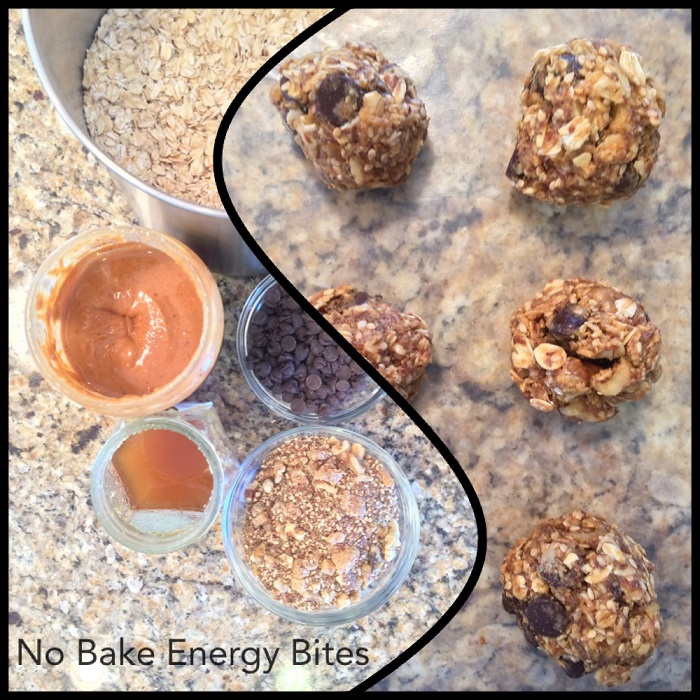 DOWNLOAD RECIPE HERE: NoBakeEnergyBites
DOWNLOAD RECIPE HERE: NoBakeEnergyBites
Vegan Chocolate Mousse-4 Ingredients
Tips and Recipe Link: Download PDF here ChocolateMousseTips
Chocolate-raspberry-orange soufflé
SPECIAL RECIPE!

Chocolate-raspberry-orange soufflé from Dr. Masley’s book THE 30-DAY HEART TUNE UP. CLICK HERE: Masley Chocolate Raspberry Souffle
Track Your Chocolate Cravings
DOWNLOAD NOW: MindfullyTRACKYOURCRAVINGS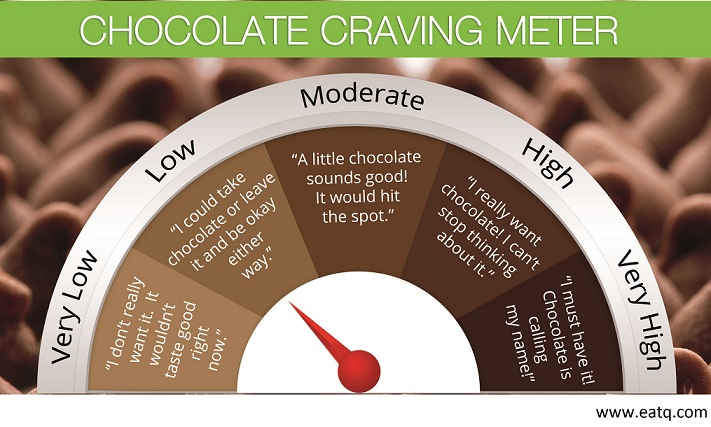
Mindful Eating Pledge
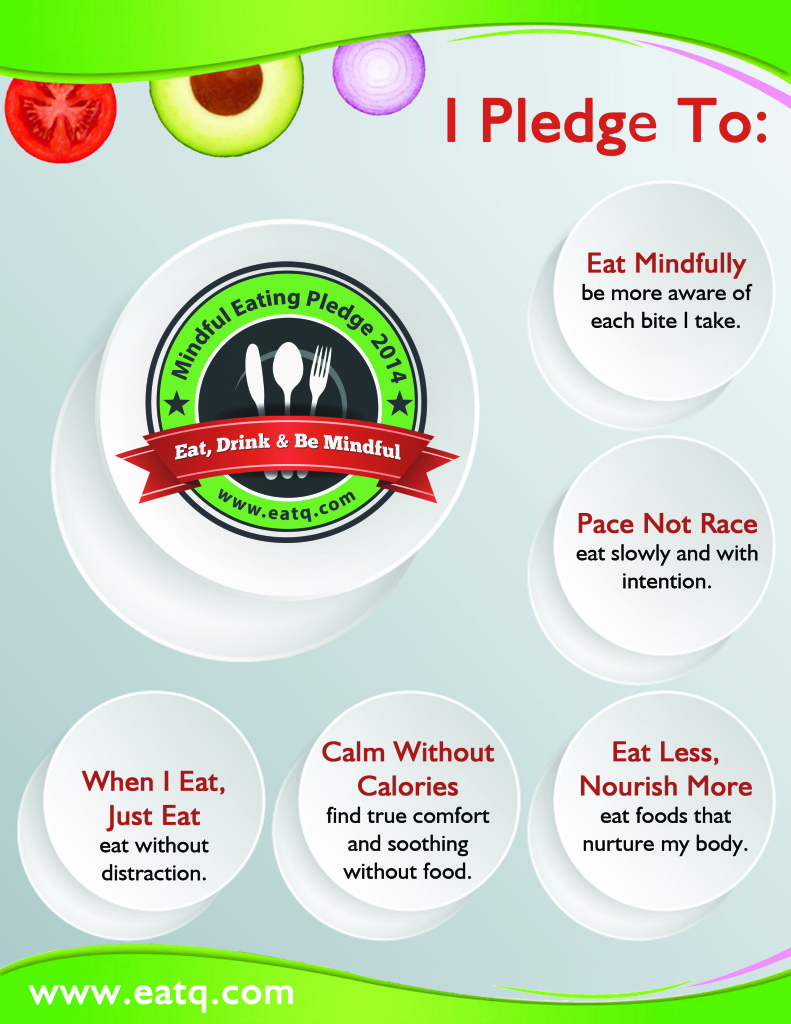
DOWNLOAD HERE: MindfulEatingPledge
Yoga & Mindful Eating: Free Download
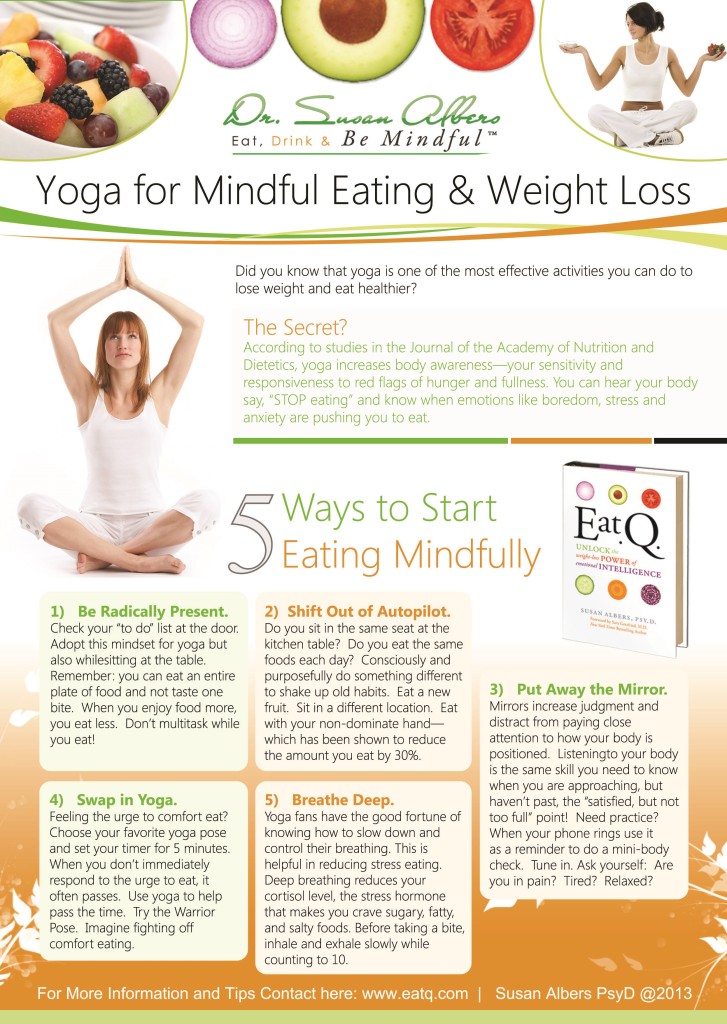 Download HERE: YogaTipsforMindfulEating
Download HERE: YogaTipsforMindfulEating
Mindful Eating for Yoga–Free Download
 Click Here for Download: YogaTipsforMindfulEating
Click Here for Download: YogaTipsforMindfulEating



